
Founded in Waverly, IA in 1959 by Vern Schield, Self-Help 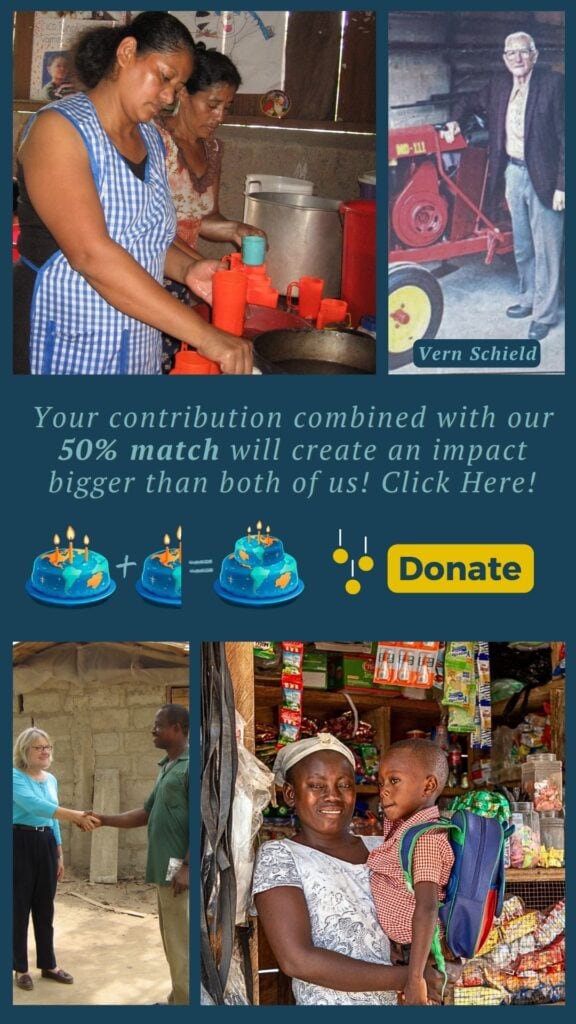 International is a nonprofit dedicated to alleviating hunger by helping people help themselves. Self-Help commits to working with rural communities to improve agriculture, nutrition, and health, and fosters economic opportunities until families are able to achieve self-sufficiency. Self-Help’s current commitments are in Nicaragua, Central America and Ghana, West Africa.
International is a nonprofit dedicated to alleviating hunger by helping people help themselves. Self-Help commits to working with rural communities to improve agriculture, nutrition, and health, and fosters economic opportunities until families are able to achieve self-sufficiency. Self-Help’s current commitments are in Nicaragua, Central America and Ghana, West Africa.
For 65 incredible years, we’ve been transforming lives, one community at a time. From empowering women entrepreneurs to teaching farmers new techniques and mothers how to provide nutritious food, our journey has touched countless lives across Ghana, Nicaragua, and beyond.
During our 65th birthday celebration, your impact will be amplified with a 50% match on all donations up to $65,000*! Don’t wait until the end of the year, give NOW to make your contribution go further and build sustainable lives. Your donation could:
To Donate – Give Online Here, Call 319.352.4040, or Mail to:
Self-Help International
207 20th St. NW Suite A
Waverly, IA 50677
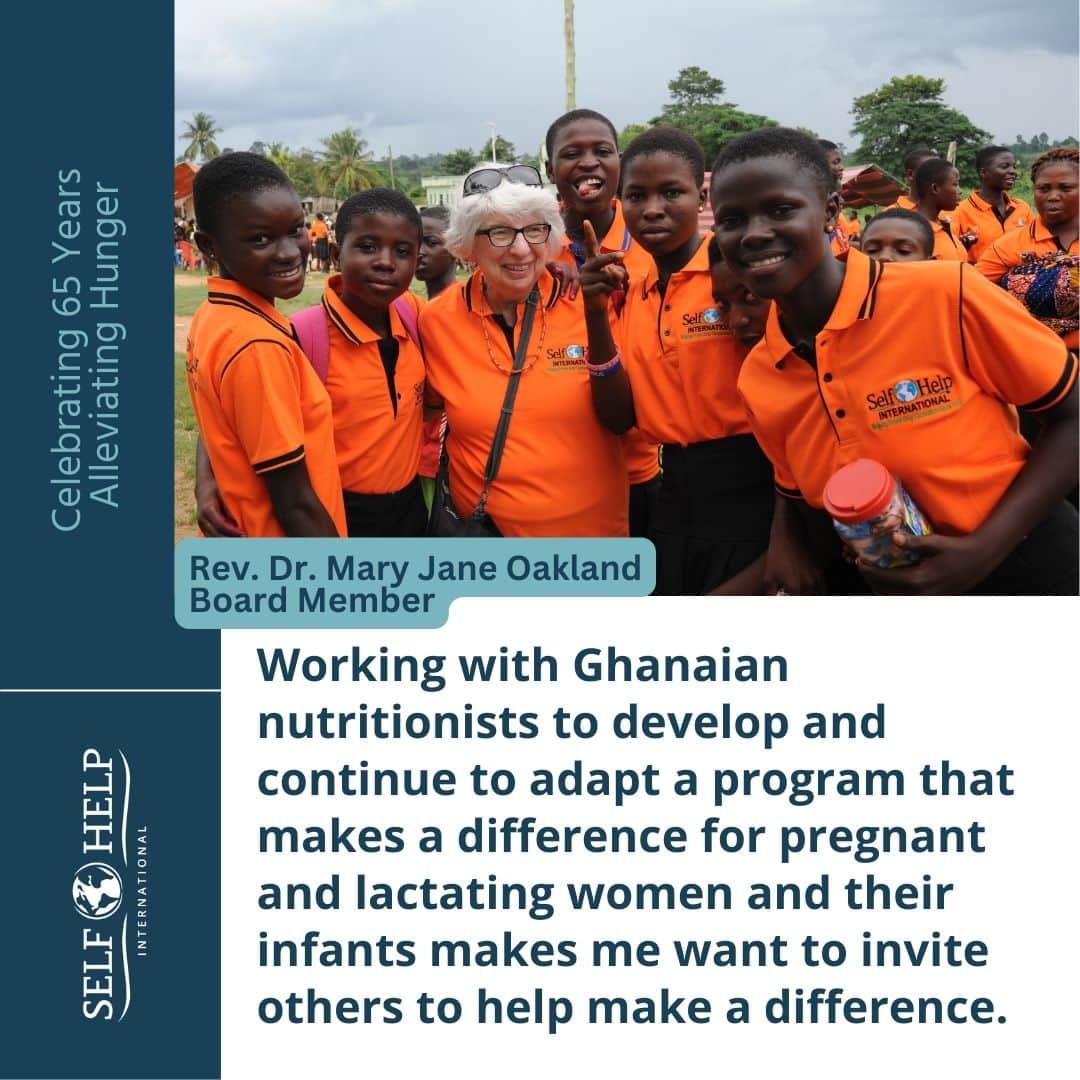
As a member of the Iowa State University Faculty, I was asked to join the Board of Directors of SHI in 2006. I have stayed on the Board since retirement because my values and fiscal sensibilities align with how this organization works to Alleviate Hunger by Helping People Help Themselves. Watching the budget decisions, and reviewing the financial reports, convinces me that this NGO does as much good as can be done with the financial support we receive. And in traveling to Nicaragua and Ghana, I found the SHI motto isn’t just something to put on our letterhead and website. Watching our dedicated in-country staff work with clients has inspired me to help staff consider our work through the lens of improving nutritional status/health, with the Growing Healthy Food/Growing Healthy Children focus to decrease high levels of stunting in children under 2 years of age, which affects brain development and affects them for the rest of their lives. Working with Ghanaian nutritionists to develop and continue to adapt a program that makes a difference for pregnant and lactating women and their infants makes me want to invite others to help make a difference. And now SHI, has expanded into the Ullo Traditional District in the Upper West of Ghana, where most of the villagers are very food insecure for a large portion of the year, and the levels of malnutrition in young children is high. Unfavorable climate changes mean that what worked for farming in the past, will no longer produce enough to feed the people in the area. SHI is beginning the work to put our motto into practice to help another group of smallholder village farmers (both men and women) meet those challenges.
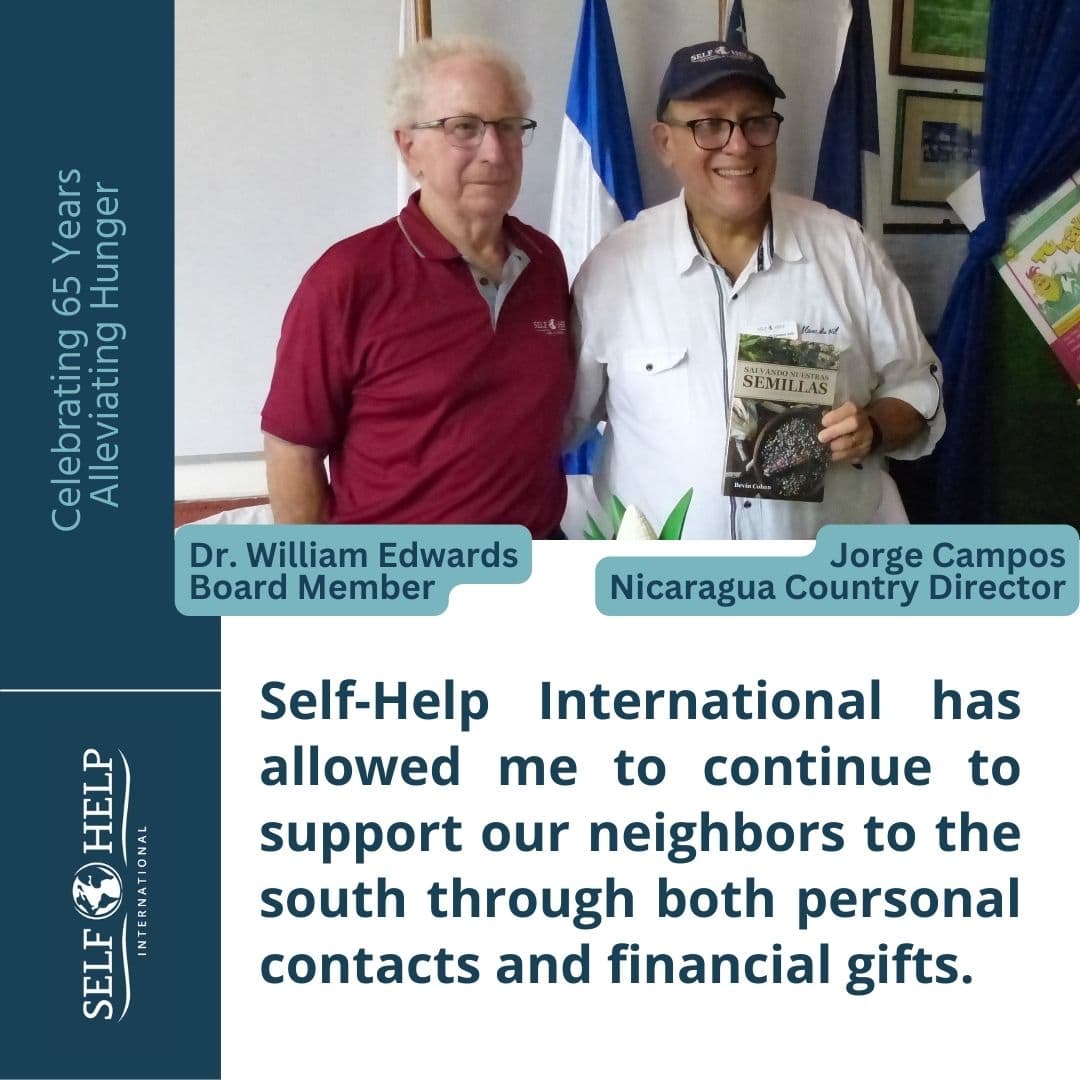
Ever since serving as a Peace Corps volunteer in Colombia I have maintained a strong interest in serving farmers and rural households in Latin America. I have made over 40 trips there through Iowa State University programs and personal travel. In retirement, Self–Help International has allowed me to continue to support our neighbors to the south through both personal contacts and financial gifts.
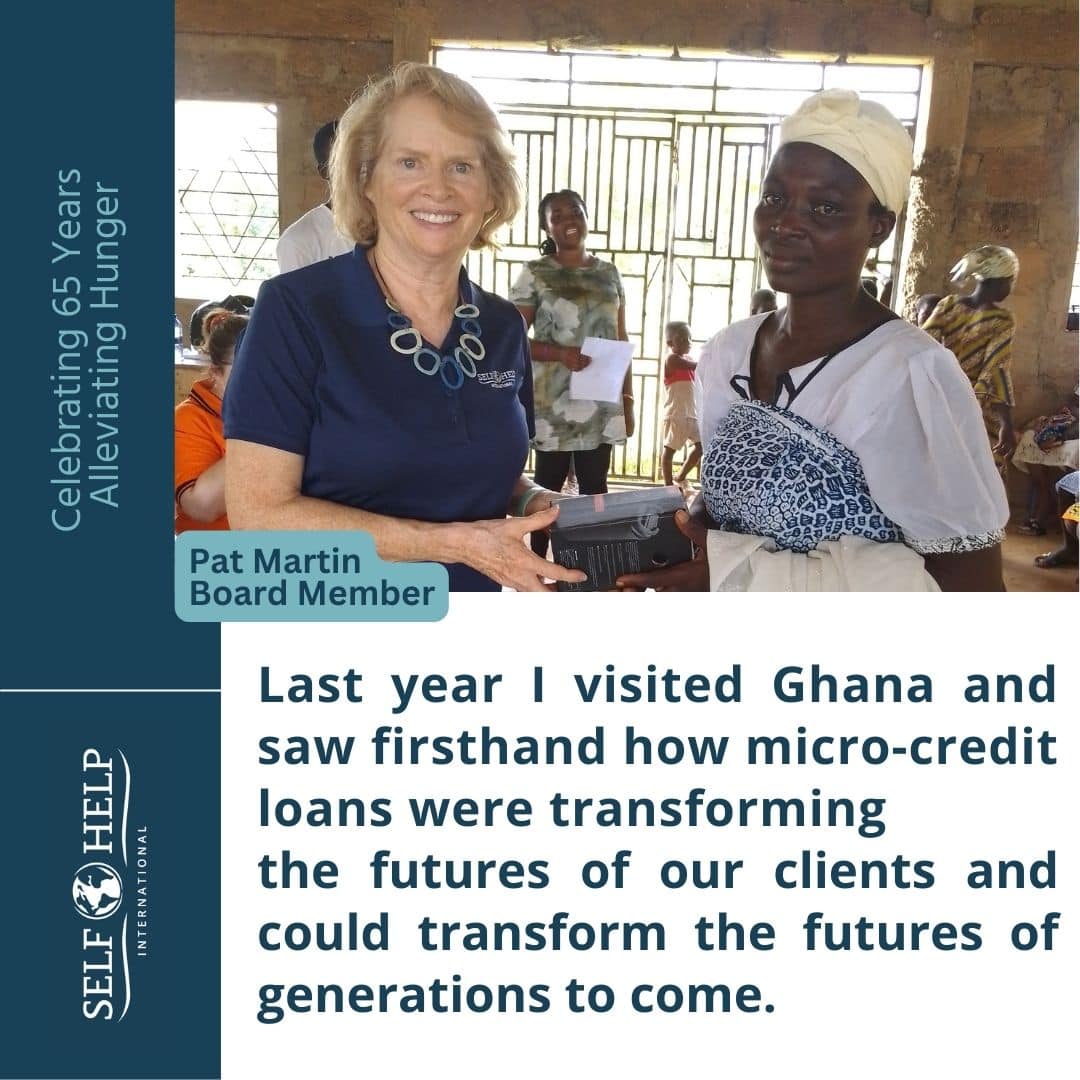
I became aware of Self-Help International before I joined the board. My friends and I had created an informal “giving circle” in which we targeted economic development projects for international women. Self-Help’s mission of sustainable aid, through education and training, was attractive and seemed effective. Once I retired, with more time to give to SHI, I became even more impressed with the results I observed.
Last year I visited Ghana and saw firsthand how micro-credit loans were transforming the futures of our clients and could transform the futures of generations to come. I am convinced that the self-help concept of training and mentoring, such as providing a loan and training on how to start or expand a business, is a more effective way to help, rather than just providing food, for example.
Our in-country staff are experts in education and training, so that our clients can achieve their entrepreneurial, educational. or nutritional goals, changing their lives and their family’s lives for the better! And so importantly, we are there for the long run!

My first exposure to SHI came in the 1960’s when Vern Schield asked my Father (Robbins Fischer) to join the Board due to his international experience in soybean processing and the use of soy protein in feeding starving children in underdeveloped countries. Even then, the focus of SHI was on how to help motivated people learn how to help themselves produce more food more economically. When small tractors like the Self-Helper started being made in countries around the world for less cost, SHI focused on just two countries and finding other ways to help determined people take those very first steps up the economic ladder.
Dad introduced Dr. Bert Schou to Self Help and his experience in agricultural research was especially helpful in working with farmers in Nicaragua to accept the high-protein corn developed by Norman Borlaug’s laboratory. SHI found ways to demonstrate how the combination of higher yields and better nutrition was worth the price of the CPM corn seed – and now some farmers even grow certified seed to help their countrymen to healthier families.
Dr. Schou, in turn, asked me to join SHI and continue to give people ways to help themselves. Thankfully we are dealing more with child malnutrition now than the actual starvation my Father witnessed many years ago. However, it is only children with proper nutrition (especially their first 1,000 days) whose brains will develop properly. If families can afford to keep them in school, the children can become leaders who will turn their villages into towns that buy and sell locally produced products and services for themselves and their neighbors. The first painful steps from surviving another day to building a community are the most important, and the hardest.
The programs of Self Help International bring training and critical support to people taking those first painful steps and this is why I am glad to help them succeed and especially to expand into new areas.
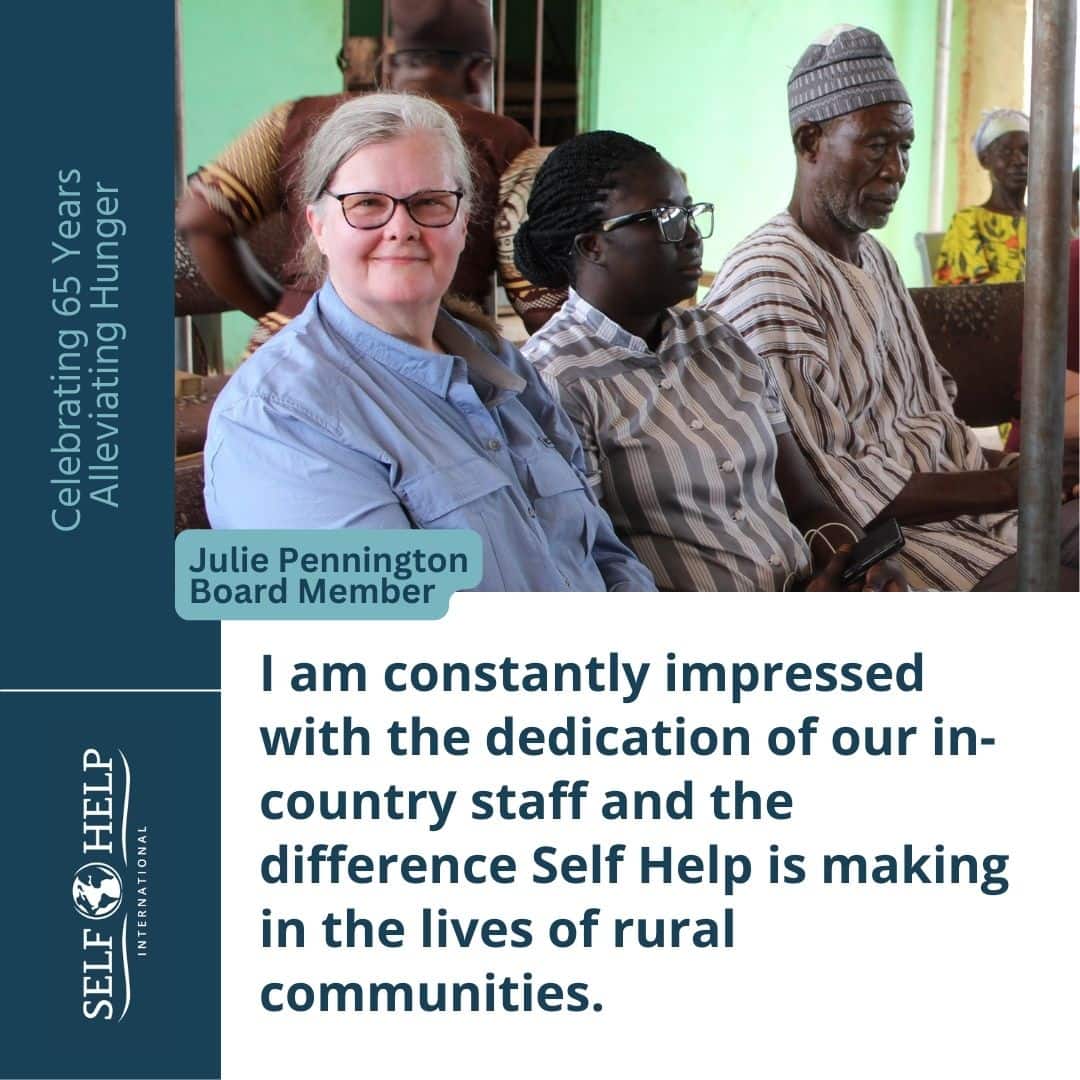
I have been impressed with Self Help since I was a teenager in northern Iowa. Self Help was started in Wavery, Iowa, which is 45 minutes from where I grew up in Rudd. Self Help was founded in 1959 to help international farmers with limited resources get ahead and become self-sufficient. The philosophy has always been to help local communities help themselves by providing knowledge, teaching skills, and demonstrating best practices. Self Help has grown over the years and now helps local communities in Ghana and Nicaragua in not only agriculture, but also in nutrition for women & children, clean water, and micro-financing.
I joined the Self Help board in January 2023. I am constantly impressed with dedication of our in-country staff and the difference Self Help is making in the lives of rural communities. I am proud to donate my time and money to an organization that has Iowa values (honest, focused, and fiscally responsible) and is making a difference every day.
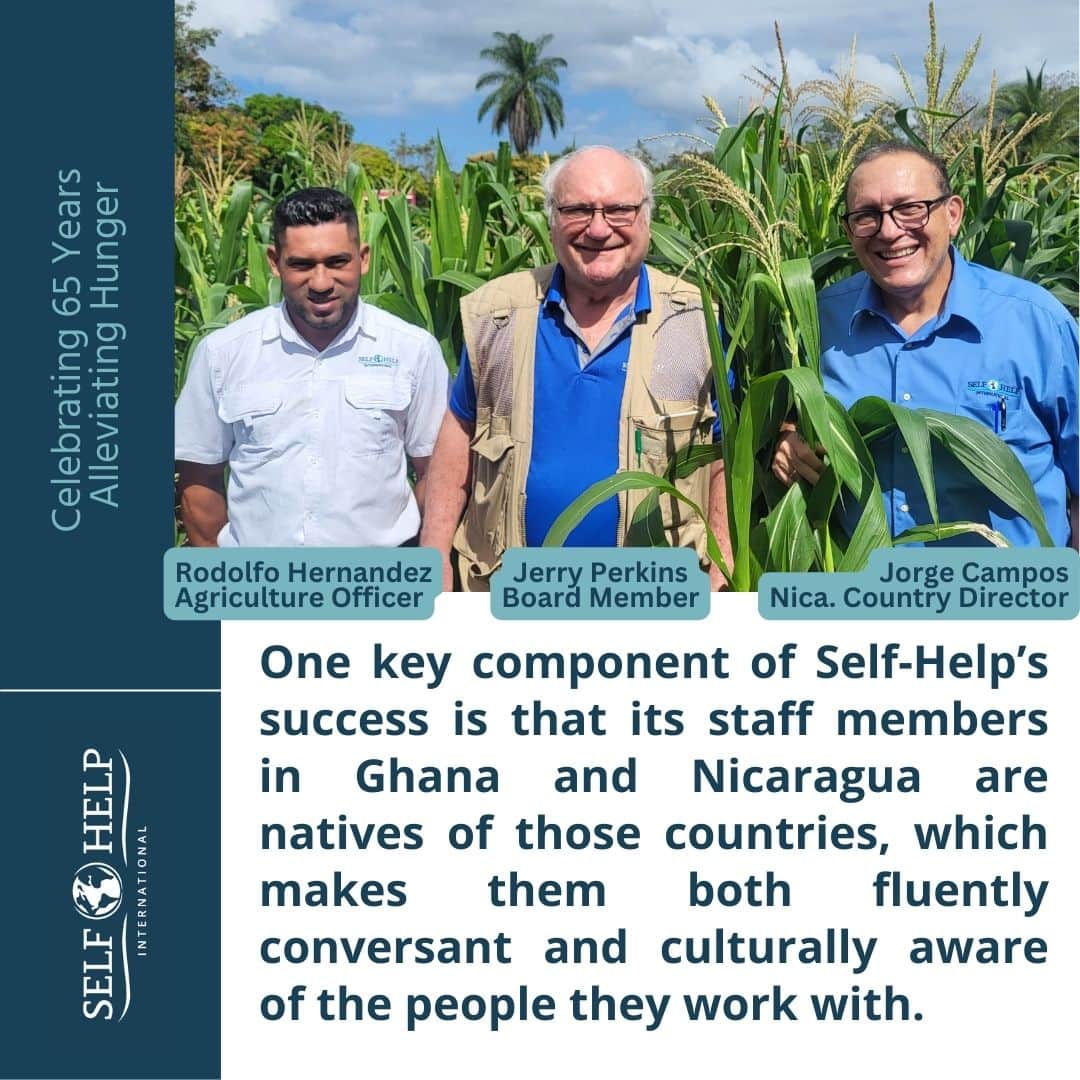
I first became aware of Self-Help International when I read an article in the early Seventies in the Des Moines Register about Vern Schield’s efforts to assist farmers in developing countries by sending them “Self-Helper” tractors that he was crafting in Waverly, Iowa, in the Fifties and Sixties. Little did I know then that, decades later, I would serve on the Self-Help board of directors as the organization works to alleviate hunger and malnutrition in Ghana and Nicaragua.
I learned more about Self-Help when I became the farm editor of the Des Moines Register in June 1993 and covered the World Food Prize in October that year. The World Food Prize was founded by Iowa native Norman Borlaug, who had been awarded the Nobel Peace Prize in 1970 for his work developing high-yielding wheat that was resistant to rust disease. Borlaug, who was known as the Father of the Green Revolution, was credited with saving a billion lives by increasing farmers’ productivity, helping them feed themselves, their families, and their countries.
In an interview with Borlaug during the 1993 World Food Prize activities, he stated that he and Jimmy Carter worked with Self-Help in Ghana to introduce and promote the cultivation of Quality Protein Maize (QPM), a high-protein corn variety that had been improved by scientists at the Center for the Improvement of Corn and Wheat in Mexico City under Borlaug’s sponsorship. QPM is more nutritious because its protein content is close to skim milk’s protein content. QPM also increased yields and was highly palatable in foods where corn is a staple of the human diet as it is throughout Africa and Central America.
My interest piqued, I visited Waverly, where Self-Help had been headquartered since its inception by Schield in 1959. I interviewed Lew Hille, who was then Self-Help’s executive director, and wrote an article about the organization and its work with Borlaug and Carter in Ghana. Through my involvement in Iowa agriculture, I had come to know Fran and Howard Mueller, who farmed near Waverly and who were Self-Help board members and longtime supporters.
In 1999, I learned that Self-Help had introduced QPM in Nicaragua after Hurricane Mitch destroyed much of the Central American country’s agriculture infrastructure. I had a personal interest in Nicaragua, having served as a Peace Corps Volunteer there in 1971-72 and I wrote an article for the Register about Self-Help’s new involvement in Nicaraguan agriculture. Nineteen years later, when I made my first visit to Nicaragua as a Self-Help board member in 2018, I saw a copy of the article I had written about Self-Help’s introduction into Nicaragua hanging on the wall of Self-Help Nicaragua’s headquarters in San Carlos.
Fran Mueller had asked me to join the Self-Help board several years earlier and, when I retired in 2018, I took her up on her offer and was elected to my first 3-year term as a board member. I traveled to Ghana in November 2018 with Self-Help’s executive director Nora Tobin and Mary Jane Oakland, a longtime Self-Help board member and former faculty member at Iowa State University, where she taught nutrition. As a Self-Help board member, Oakland spearheaded a very successful effort in Ghana called “Growing Healthy Food, Growing Healthy Children.” Oakland designed and has actively monitored implementation of the nutritional program, which combines agriculture and women’s empowerment with nutrition education and support to prevent stunting in the first 1,000 days of life for babies living in rural villages served by Self-Help in Ghana.
The impact of Oakland’s highly successful efforts showed me conclusively that Self-Help was an organization that was making a difference in fulfilling its mission to overcome hunger and malnutrition. A subsequent trip to Nicaragua underscored my belief that Self-Help’s introduction of QPM’s high-protein crops has improved the diets of Nicaraguans and boosted the productivity of its farmers.
Self-Help also runs successful programs such as the Teen Girls Clubs in Ghana, clean water initiatives in Nicaragua, micro-credit loans that fuel the Women’s Empowerment Programs in both countries, and the adoption of more productive and sustainable agriculture practices in Ghana and Nicaragua.
One key component of Self-Help’s success is that its staff members in Ghana and Nicaragua are natives of those countries, which makes them both fluently conversant and culturally aware of the people they work with.
After six years on the Board of Directors, I am proud to be a supporter of Self-Help International.